Removal Procedure
Tools Required
| • | J 5239 Connecting
Rod Bolt Guide Set |
| • | J 24270 Cylinder
Bore Ridge Reamer |
- Raise and suitably support the vehicle. Refer to
Lifting and Jacking the Vehicle
in General Information.
- Remove the oil pan. Refer to
Oil Pan Replacement
.
- Remove the oil pump. Refer to
Oil Pump Replacement
.
- Remove the crankshaft oil deflector. Refer to
Crankshaft Oil Deflector Replacement
.
- Turn the crankshaft until the piston and rod assembly to be serviced
is at Bottom Dead Center (BDC).
- Lower the engine onto the frame.
- Lower the vehicle.
- Remove the engine support fixture.
- Remove the cylinder head(s). Refer to
Cylinder Head Replacement
.
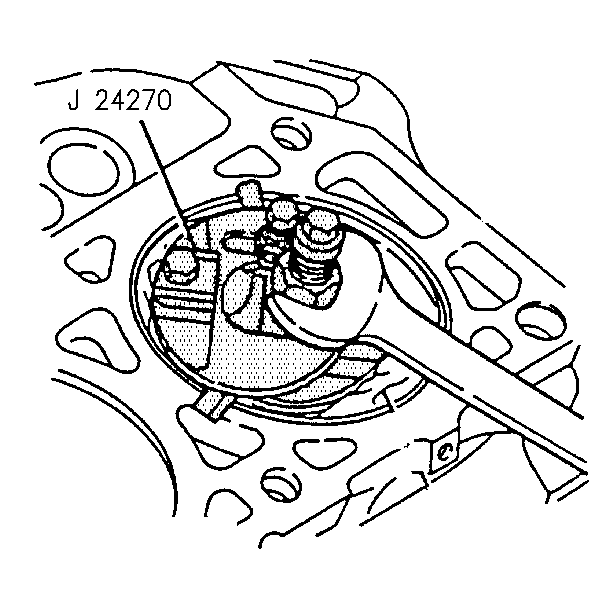
- Use the following procedure
in order to remove the ring ridge, as necessary:
| 10.1. | Turn the crankshaft until the piston is at the bottom of its stroke. |
| 10.2. | Place a cloth on top of the piston. |
| 10.3. | Use the J 24270
in order to remove the piston ring ridge. |
| 10.4. | Turn the crankshaft so that the piston is at the top of its stroke. |
| 10.5. | Remove the cloth and cutting debris. |
- Raise and suitably support the vehicle. Refer to
Lifting and Jacking the Vehicle
in General Information.
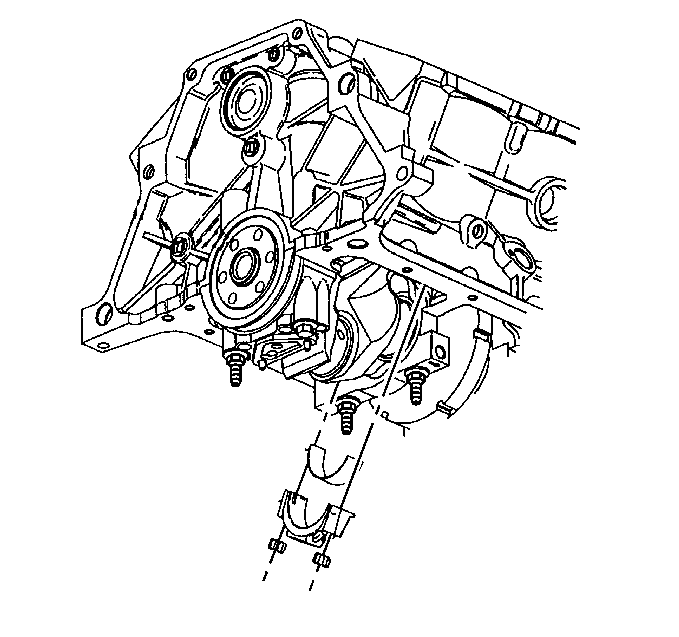
Important: Place matchmarks or numbers on the connecting rod and connecting rod
caps. The connecting rod caps must be assembled to their original connecting
rod.
- Remove the connecting rod nuts.
- Remove the connecting rod cap.
- Remove the lower connecting rod bearing.
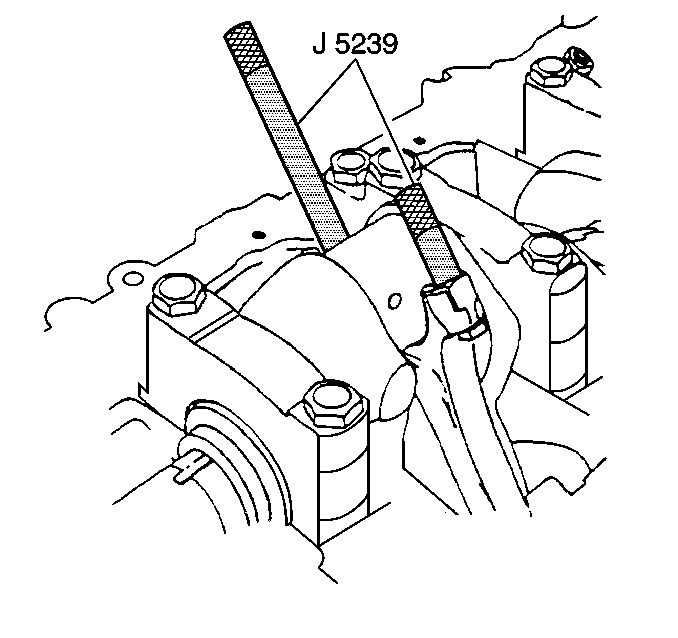
Notice: Install thread protector in order to avoid damage to the crankshaft
journal.
- Install the J 5239
.
- Push the piston and rod up through the cylinder.
- Lower the vehicle.
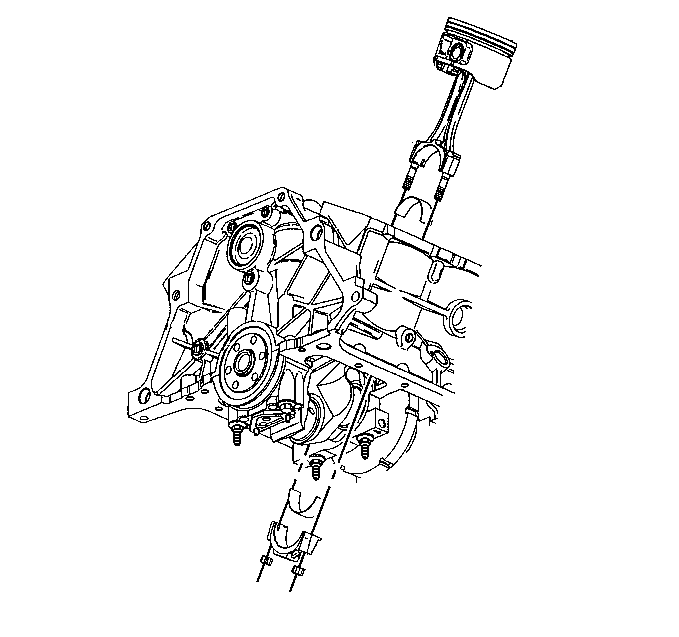
- Remove the connecting
rod, upper connecting rod bearing and piston out of the top of the engine
block.
- Wipe oil from the connecting rod bearings and crankshaft connecting
rod journal.
- Inspect the piston. Refer to Piston, Connecting
Rod, and Bearings Clean and Inspect
.
- Inspect the connecting rod bearings. Refer to Piston, Connecting Rod, and Bearings Clean and Inspect
.
- Inspect the connecting rod cap and connecting rod. Refer to Piston, Connecting Rod, and Bearings Clean and Inspect
.
- Inspect the crankshaft connecting rod journal. Refer to Crankshaft and Bearings Clean and Inspect
.
- Protect the crankshaft journals from honing debris.
- Clean the cylinder bores with a light honing.
- Clean the cylinder bores with hot water and detergent.
- Swab the bores with a clean, dry cloth.
- Swab the bores with new engine oil and a clean, dry cloth.
Installation Procedure
Tools Required
| • | J 5239 Connecting
Rod Bolt Guide Set |
| • | J 8037 Piston
Ring Compressor |
- Coat the piston, the piston rings, the cylinder bore, and the
bearing surfaces with new engine oil.
- Install the J 5239
.
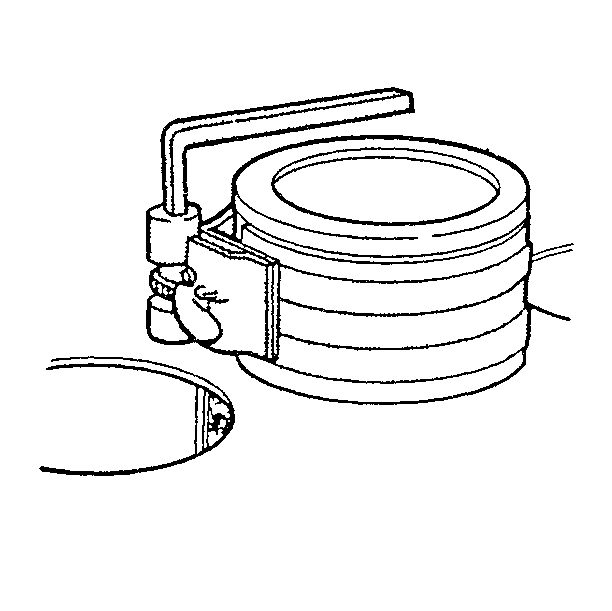
- Compress the piston rings
using the J 8037
.

- When installing the piston
and connecting rod assembly, the stamped arrow on the piston must point to
the front of the engine while the flange on the connecting rod must
face toward the front of the piston on the left hand, and face toward
the rear of the piston on the right hand.
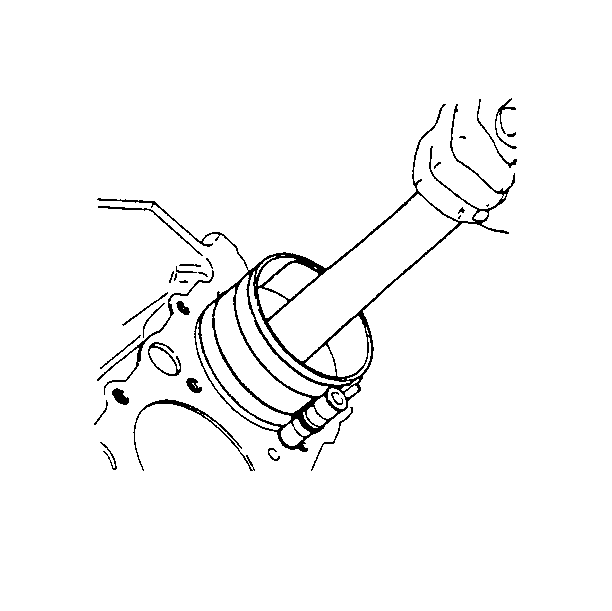
- Install the piston into
its original bore using the J 5239
and the J 8037
and lightly tapping the top of the piston with a wooden hammer handle.
- Firmly hold the J 8037
against the engine block until all of the piston rings have entered
the cylinder bore.
- Raise and suitably support the vehicle. Refer to
Lifting and Jacking the Vehicle
in General Information.
- Install the upper connecting rod bearing into the connecting rod.
- Coat the inside surfaces of the upper connecting rod bearing with
new engine oil.
- Using the J 5239
pull the piston and rod assembly down to the crankshaft.
- Remove the J 5239
.

- Install the lower connecting
rod bearing into the connecting rod cap.
- Coat the inside surfaces of the lower connecting rod bearing with
new engine oil.
- Install the connecting rod cap.
Notice: Use the correct fastener in the correct location. Replacement fasteners
must be the correct part number for that application. Fasteners requiring
replacement or fasteners requiring the use of thread locking compound or sealant
are identified in the service procedure. Do not use paints, lubricants, or
corrosion inhibitors on fasteners or fastener joint surfaces unless specified.
These coatings affect fastener torque and joint clamping force and may damage
the fastener. Use the correct tightening sequence and specifications when
installing fasteners in order to avoid damage to parts and systems.
Notice: In order to prevent the possibility of rod bolt or bearing cap damage,
the bearing caps may need to be tapped into position with a brass or leather
mallet before the attaching nuts are installed. Do not use the attaching nuts
to pull the bearing caps onto the rod. Failure to observe this information
may result in damage to the rod bolt or the bearing cap.
- Install the connecting rod cap nuts. Refer to Piston,
Connecting Rod, and Bearing Installation
- Inspect the connecting rod for a binding by prying back and forth
with a suitable tool. If necessary, loosen and retighten the connecting rod
cap.
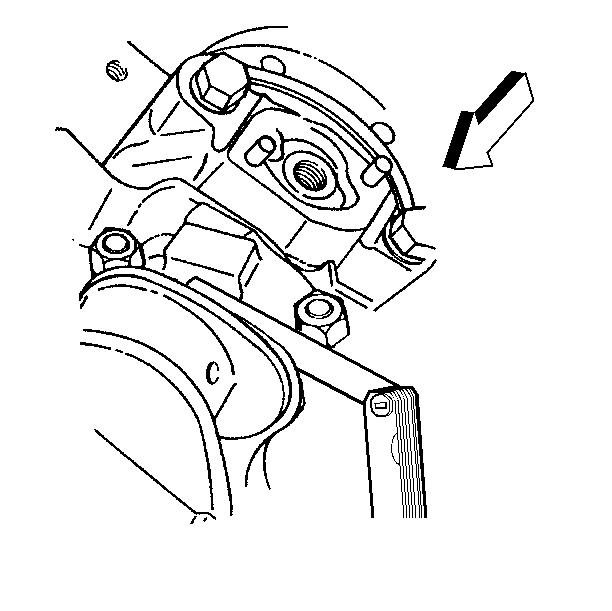
- Measure the connecting
rod clearance using the following procedure:
| 17.1. | Install all connecting rod bearings. |
| 17.2. | Lightly tap each connecting rod parallel to the crankpin in order
to make sure the connecting rods have clearance. |
| 17.3. | Measure the side clearance between the connecting rod caps using
a feeler gage, or dial indicator. Refer to Crankpin (Rod Side Clearance) in Engine Mechanical Specifications
for the connecting
rod side clearance. |
- Lower the vehicle.
- Install the cylinder head(s). Refer to
Cylinder Head Replacement
.
- Raise and suitably support the vehicle. Refer to
Lifting and Jacking the Vehicle
in General Information.
- Install the crankshaft oil deflector. Refer to
Crankshaft Oil Deflector Replacement
.
- Install the oil pump. Refer to
Oil Pump Replacement
.
- Install the oil pan. Refer to
Oil Pan Replacement
.
- Lower the vehicle.









